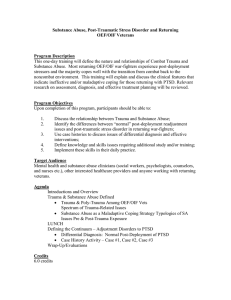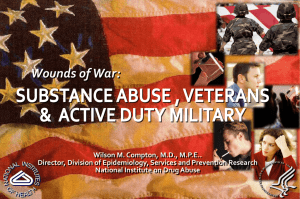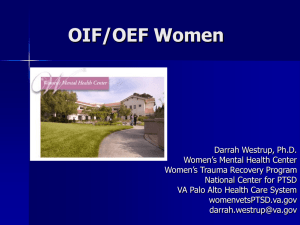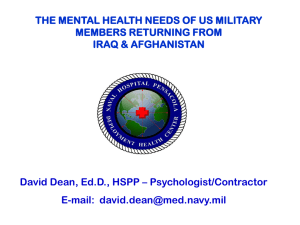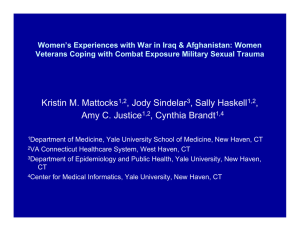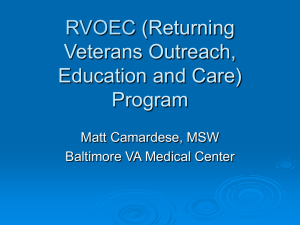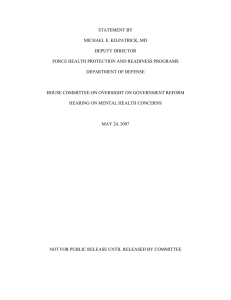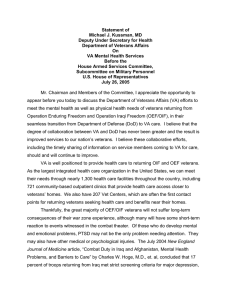PTSD, Substance Abuse and Returning OEF/OIF Guard and Reserve Veterans
advertisement
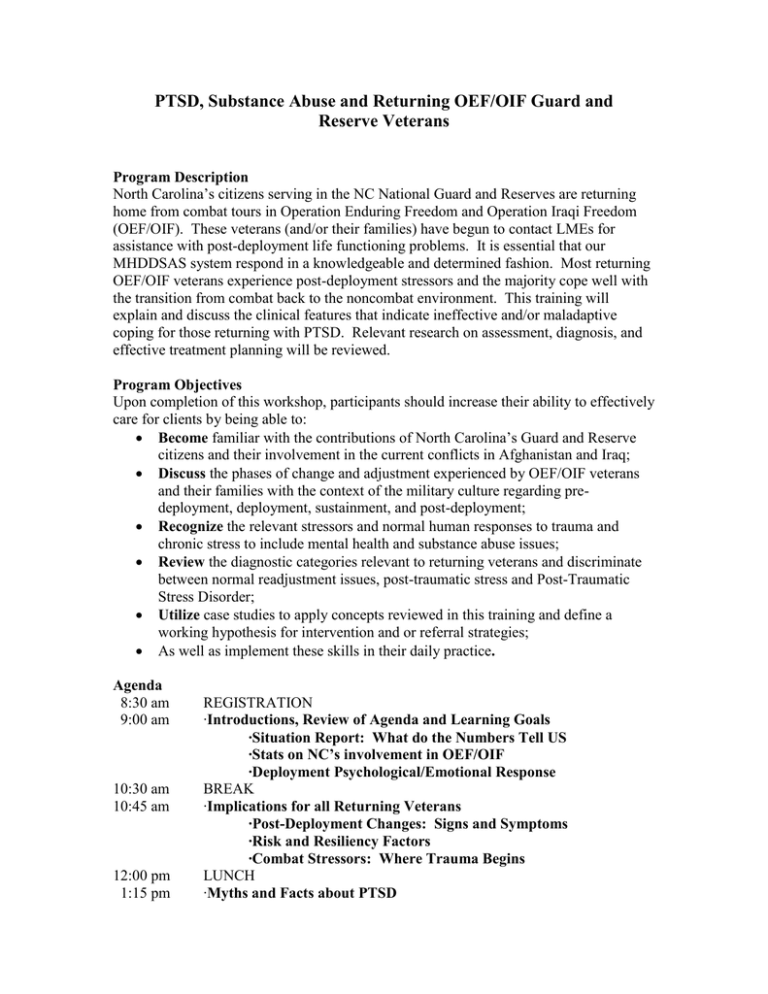
PTSD, Substance Abuse and Returning OEF/OIF Guard and Reserve Veterans Program Description North Carolina’s citizens serving in the NC National Guard and Reserves are returning home from combat tours in Operation Enduring Freedom and Operation Iraqi Freedom (OEF/OIF). These veterans (and/or their families) have begun to contact LMEs for assistance with post-deployment life functioning problems. It is essential that our MHDDSAS system respond in a knowledgeable and determined fashion. Most returning OEF/OIF veterans experience post-deployment stressors and the majority cope well with the transition from combat back to the noncombat environment. This training will explain and discuss the clinical features that indicate ineffective and/or maladaptive coping for those returning with PTSD. Relevant research on assessment, diagnosis, and effective treatment planning will be reviewed. Program Objectives Upon completion of this workshop, participants should increase their ability to effectively care for clients by being able to: Become familiar with the contributions of North Carolina’s Guard and Reserve citizens and their involvement in the current conflicts in Afghanistan and Iraq; Discuss the phases of change and adjustment experienced by OEF/OIF veterans and their families with the context of the military culture regarding predeployment, deployment, sustainment, and post-deployment; Recognize the relevant stressors and normal human responses to trauma and chronic stress to include mental health and substance abuse issues; Review the diagnostic categories relevant to returning veterans and discriminate between normal readjustment issues, post-traumatic stress and Post-Traumatic Stress Disorder; Utilize case studies to apply concepts reviewed in this training and define a working hypothesis for intervention and or referral strategies; As well as implement these skills in their daily practice. Agenda 8:30 am 9:00 am 10:30 am 10:45 am 12:00 pm 1:15 pm REGISTRATION ∙Introductions, Review of Agenda and Learning Goals ∙Situation Report: What do the Numbers Tell US ∙Stats on NC’s involvement in OEF/OIF ∙Deployment Psychological/Emotional Response BREAK ∙Implications for all Returning Veterans ∙Post-Deployment Changes: Signs and Symptoms ∙Risk and Resiliency Factors ∙Combat Stressors: Where Trauma Begins LUNCH ∙Myths and Facts about PTSD 2:30 pm 2:45 pm 4:15 pm 4:45 pm ∙The Continuum of Responses to Combat Stressors ∙Normal Responses—Adjustment Disorders ∙Post-Traumatic Stress Disorder(s) BREAK ∙Case Studies—PTSD, Substance Abuse, of Readjustment Issues? ∙Case Study #1 –Group Process ∙Case Study #2 – Group Process ∙Clinical Interventions and Resources ∙Clinical Cautions and Concerns ADJOURNMENT Faculty L. Worth Bolton, ACSW, LCAS, CCS, is currently working with the Behavioral Healthcare Resource Program in the School of Social Work at the University of North Carolina at Chapel Hill. Prior to coming to UNC, Worth has 25 years of work experience in substance abuse services to adults and adolescents in a wide variety of service settings. He is a Clinical Assistant Professor in the graduate Social Work program at UNC coordinating and teaching in the Certificate in Substance Abuse Studies Program. Worth is past Chair and Board Member of the N.C. Foundation for Alcohol and Drug Studies and currently serving on the N.C. Substance Abuse Professional Practice Board. Worth is also past Chair of the Steering Committee of NASW in the Alcohol, Tobacco and Other Drugs Practice Section. He has provided training, consultation, and technical assistance to business/industry, social service agencies, and the military. Worth is a Licensed Clinical Addictions Specialist and is certified in Clinical Supervision and Addiction Services. Additionally, Worth is a two-tour combat veteran having served in Viet Nam from 1969-1971 and ahs worked with the military and veteran groups since that time on mental health and substance abuse issues as a consultant, trainer, and clinical preceptor.
